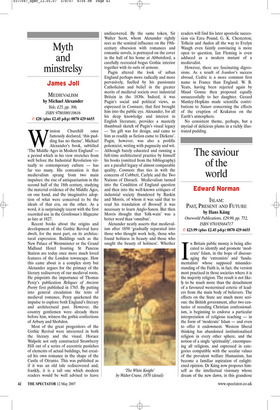Myth and minstrelsy
James Joll
MEDIEVALISM by Michael Alexander Yale, £25, pp. 306, ISBN 9780300110616 ✆ £20 (plus £2.45 p&p) 0870 429 6655 Winston Churchill once famously declared, ‘this pudding has no theme’. Michael Alexander’s book, subtitled ‘The Middle Ages in Modern England’ a period which in his view stretches from well before the Industrial Revolution virtually to contemporary culture — has far too many. His contention is that medievalism sprang from two main impulses: the rise of antiquarianism in the second half of the 18th century, studying the material evidence of the Middle Ages, on one hand, and the imaginative adoption of what were conceived to be the ideals of that era, on the other. As a word, it is surprisingly recent with the first recorded use in the Gentleman’s Magazine as late at 1827.
Recent books about the origins and development of the Gothic Revival have dwelt, for the most part, on its architectural expression. Buildings such as the New Palace of Westminster or the Grand Midland Hotel fronting St Pancras Station are today once more much loved features of the London townscape. How this came about is a complex story but Alexander argues for the primacy of the literary rediscovery of our medieval roots. He pinpoints the importance of Thomas Percy’s publication Reliques of Ancient Poetry first published in 1765. By putting into general circulation the texts of medieval romance, Percy quickened the impulse to explore both England’s literary and architectural past. However, the country gentlemen were already there before him, witness the gothic confections of Arbury and Shobdon.
Most of the great progenitors of the Gothic Revival were interested in both the literary and the visual. Horace Walpole not only constructed Strawberry Hill out of a series of eccentric pastiches of elements of actual buildings, but created his own romance in the shape of the Castle of Otranto. This was published as if it was an old tale rediscovered and, frankly, it is a tall one which modern readers would be well advised to leave undiscovered. By the same token, Sir Walter Scott, whom Alexander rightly sees as the seminal influence on the 19thcentury obsession with romances and romantic novels, is portrayed on the cover in the hall of his home at Abbotsford, a carefully recreated bogus Gothic interior together with its suits of armour.
Pugin altered the look of urban England perhaps more radically and more pervasively, fuelled by his passionate Catholicism and belief in the greater merits of medieval society over industrial Britain in the 1830s. Indeed, it was Pugin’s social and political views, as expressed in Contrasts, that first brought him into the public eye. Alexander, for all his deep knowledge and interest in English literature, provides a masterly thumbnail sketch of Pugin’s visual legacy — ‘his gift was for design, and came to him as readily as fiction came to Dickens’. Pugin, however, was also a prolific polemicist, writing with pugnacity and wit. Although barely educated and running a full-time architectural practice by himself his books (omitted from the bibliography) are a parallel legacy of almost comparable quality. Contrasts thus ties in with the concerns of Cobbett, Carlyle and the Two Nations of Disraeli. Medievalism turned into the Condition of England question and then into the well-known critiques of industrial society thundered by Ruskin and Morris, of whom it was said that to read his translation of Beowulf it was necessary to learn Anglo-Saxon. But then Morris thought that ‘folk-wain’ was a better word than ‘omnibus’.
Alexander neatly asserts that medievalism after 1850 ‘gradually separated into those who thought work holy, those who found holiness in beauty and those who sought the beauty of holiness’. Whether readers will find his later apostolic succession via Ezra Pound, G. K. Chesterton, Tolkein and Auden all the way to Evelyn Waugh even faintly convincing is more open to question. Ian Fleming is even adduced as a modern mutant of a medievalist.
However, there are fascinating digressions. As a result of Ivanhoe’s success abroad, Cedric is a more common first name in France than England. W. B. Yeats, having been rejected again by Maud Gonne then proposed equally unsuccessfully to her daughter. Gerard Manley-Hopkins made scientific contributions to Nature concerning the effects of the eruption of Krakatoa on the Earth’s atmosphere.
No consistent theme, perhaps, but a myriad of delicious plums in a richly illustrated pudding.










































































 Previous page
Previous page